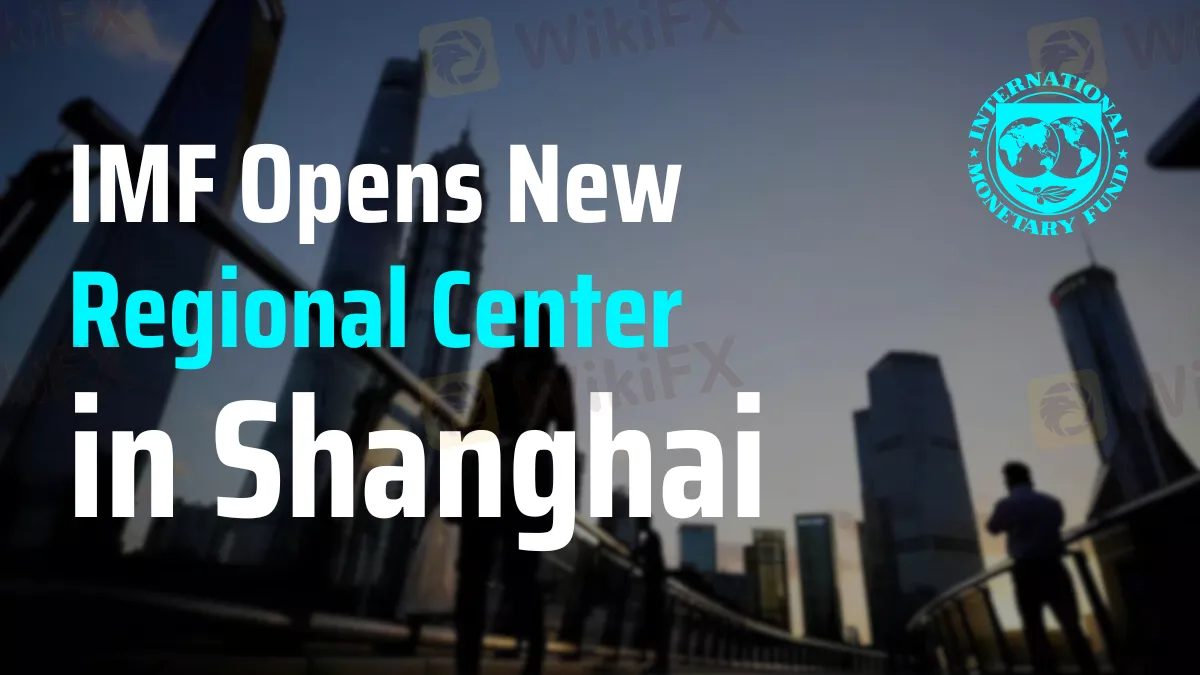简体中文
繁體中文
English
Pусский
日本語
ภาษาไทย
Tiếng Việt
Bahasa Indonesia
Español
हिन्दी
Filippiiniläinen
Français
Deutsch
Português
Türkçe
한국어
العربية
IMF Opens New Regional Center in Shanghai
Abstract:International Monetary Fund (IMF) launches a new regional center in Shanghai to boost Asia-Pacific cooperation and policy research.

The International Monetary Fund (IMF) has opened a new regional center in Shanghai, China, with the goal of increasing its participation and collaborations across the Asia-Pacific region. In order to improve economic cooperation and policy coordination among emergent markets and middle-income countries in the region, this strategic initiative, which was announced in partnership with the People's Bank of China (PBoC), represents a substantial stride.
In order to address the economic landscape of the region, the Shanghai Regional Center will function as a focal point for policy research and dialogue. The center endeavors to enhance the IMF's involvement in regional economic matters by cultivating close relationships with member countries and a variety of stakeholders, such as international financial institutions, academicians, think institutes, the private sector, and civil society organizations (CSOs).
The center's mission is fundamentally centered on the promotion of targeted capacity building. In conjunction with the China IMF Capacity Development Center (CICDC), this will be accomplished through initiatives such as peer-to-peer learning. The co-location of the CICDC with the new Shanghai center is designed to optimize resources and generate synergies, thereby improving the efficacy of the IMF's capacity development initiatives.

Pan Gongsheng, Governor of the People's Bank of China, conveyed his endorsement of the new center, stating, “We are pleased to see the IMF Regional Center in Shanghai.” We are confident that the Shanghai Regional Center will strengthen the collaboration between the IMF and China, improve the exchange and coordination of macroeconomic policy among the Asia-Pacific countries, and contribute to the stability of the global and regional financial systems.
The establishment of this facility serves as a testament to China's dedication to the IMF's mission. Financial contributions from the Chinese government have been instrumental in the establishment of the Shanghai Regional Center and the enhancement of capacity development through the CICDC.

IMF Managing Director Kristalina Georgieva emphasized the importance of this move, stating, I appreciate the crucial initiative with the People's Bank of China to create the Shanghai Regional Center. The IMF's involvement in the dynamic Asia-Pacific region will be further fortified by the center, which will also enhance our comprehension of the perspectives of member countries and promote international economic cooperation.
The Shanghai Regional Center is well-positioned to complement the IMF's current regional centers and offices, which perform distinct functions but collaborate to improve global financial stability. This new institution is intended to have a significant impact on setting economic policy and boosting international collaboration in one of the world's most economically vibrant areas.

Disclaimer:
The views in this article only represent the author's personal views, and do not constitute investment advice on this platform. This platform does not guarantee the accuracy, completeness and timeliness of the information in the article, and will not be liable for any loss caused by the use of or reliance on the information in the article.
Read more

Webull Launches SMSF Investment Platform with Zero Fees
Webull introduces commission-free SMSF trading, offering over 3,500 US and Australian ETFs, with no brokerage fees and enhanced portfolio tools.

Australian Authorities Joins Forces with Philippine Authorities to Combat Cyber Scams
AFP tackles cyber scam boiler rooms in the Philippines, training police to fight fraud and protect Australians from romance and cryptocurrency scams.

Steam Set to Launch Blockchain Game “Paradise” Amid Scam Allegations
“Paradise,” a blockchain-based game accused of being a crypto scam, is set for release on Steam, sparking concerns over platform’s ban enforcement and consumer risks.

Coinbase Phishing Scams Drain $46M from Users in Two Weeks
Coinbase phishing scams cost users $46M in two weeks. Learn how scammers target the crypto exchange and tips to stay safe.
WikiFX Broker
Latest News
FCA Warns Against 10 Unlicensed or Clone Firms
CySEC Warns Against 14 Unlicensed Investment Websites
Top Currency Pairs to Watch for Profit This Week - March 31, 2025
Will natural disasters have an impact on the forex market?
Philippines Deports 29 Indonesians Linked to Online Scam Syndicate in Manila
Exposing the Top 5 Scam Brokers of March 2025: A Closer Look by WikiFX
Gold Prices Climb Again – Have Investors Seized the Opportunity?
Webull Launches SMSF Investment Platform with Zero Fees
Australian Regulator Warns of Money Laundering and Fraud Risks in Crypto ATMs
AI-Powered Strategies to Improve Profits in Forex Trading
Currency Calculator







